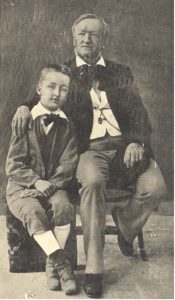About Richard Wagner
Wagner Quotes
“Man in his entirety must be in evidence for the expression of the most exalted, and this whole man is intellectual man united with physical and emotional man, not any one of these by themselves”

“In drama we must understand through feeling.”
“The mystic is the man for me…the man who feels the urge to ignite for himself the inner light in contrast to the outer brightness which shows him nothing. The name of illuminati was for this reason very aptly chosen, only, as Schopenhauer rightly says, one must be able to strip off the layers which the catechism spreads over such natures.”
The Diaries of Cosima Wagner March 17, 1873
“If I wrote about the Jews again, I would say that there is nothing to be held against them, only that they came to us Germans too soon and we were not stable enough to absorb this element.”
The Diaries of Cosima Wagner. November 21, 1888
“A direct relation to morality has not as yet been generally ascribed to music. In fact, music has even been judged as morally harmless. But that is just not so. Could an effeminate and frivolous taste remain without influence on a man’s morality? Both go hand in hand and act reciprocally upon each other. We could refer back to the Spartans, who forbade a certain type of music as injurious to morals. But instead, let us just think back to our own immediate past. With tolerable certainty we can state that those who have been inspired by Beethoven’s music have been more active and energetic citizens-of-state than those bewitched by Rossini, Bellini, and Donizetti, a class consisting for the most part of rich and lordly do-nothings.”
From the article “A National Theater”
“German poetry, music and philosophy are nowadays esteemed and honored by every nation in the world; but in his yearning after “German Glory,” the German, as a rule, can dream of nothing but a sort of resurrection of the Roman Empire, and the thought inspires the most good-tempered German with an unmistakable lust for mastery, a longing for the upper-hand over the other nations. He forgets how detrimental to the welfare of the German peoples that notion of the Roman state has been already. Jesus teaches us to break through the barriers of patriotism and find our amplest satisfaction in the wealth of the human race.”
“Through its measureless value to the individual does the Christian religion prove its lofty mission, and that through its dogma.”
“Is the German already tottering to his fall? Woe to us and to the world if the nation itself were saved and the German folk remained, but the German spirit had taken flight for the sake of power.”
“I have no connection whatever with the present anti-Semitic movement. An article of mine about to appear in Bayreuther Blätter will state this in such a way that it should be impossible for intelligent people to identify me with this movement.”
In a letter to Angelo Neumann February 23, 1881
“I am no composer, I only wanted to learn enough to compose Leubald und Adelaïde, and that is how things have remained – it is only the subjects which are different.”
The Diaries of Cosima Wagner January 23, 1870
“Prometheus’s words ‘I took knowledge away from Man’ came to my mind and gave me a profound insight; knowledge, seeing ahead, is in fact a divine attribute, and Man with this divine attribute is a piteous object. He is like Brahma before the Maya spread before him the veil of ignorance, of deception; the divine privilege is the saddest thing of all.”
The Diaries of Cosima Wagner November 29, 1871
“Only the profound hypothesis of reincarnation has been able to show me the consoling point where all converge in the end to an equal height of redemption, after their divers life-careers, running severed side-by-side in time, have met in full intelligence beyond it. On that beautiful Buddhist hypothesis, the spotless purity of Lohengrin becomes easy to explain, in that he is the continuation of Parzival – who first had to wrest to himself his purity.”
Letter to Mathilde Wesendonck
“In Tannhauser, I had yearned to flee a world of frivolous and nauseating sensuousness – the only form our modern present life has to offer.”
“The most burning need of the present generation is that of Universal Human Love; and we can but look with full assurance to a future element in life in which this love must needs give birth to works undreamt of as yet, works that shall turn those scraps and leaving of Greek art to unregarded toys for fractious children.”
From “Art and Climate”
“God is in us – The world is vanquished. Who created it? Idle question! Who vanquished it? God in our hearts!”
Asyl, Good Friday, 1856
“I should like to introduce to you a poet whom I recently recognized as the greatest of all poets, the Persian poet Hafiz, of whom there is now a very enjoyable German version. Having gotten to know this poet, I am really appalled by the poor appearance that we make with our pompous European intellectual culture, compared with what the East has produced in such security, exaltation, joy and peace of the spirit.”
Letter to Röckel September 12, 1852
“I am reading the German mystics, and today, [the 14th Century monk Johannes] Tauler. The coming of grace is particularly enthralling. All the same, everything is more spacious, peaceful and serene on the Ganges than in the cells of these Christian monasteries.”
“Sie wissen, wie ich unwillkürlick zum Buddhisten geworden bin” (You know that I have instinctively become a Buddhist).
Letter to Mathilde Wesendonck, February 22, 1859
“There is indeed much that we will admit to among ourselves. For example, since becoming acquainted with Liszt’s compositions, I have become a completely different person harmonically. But when friend Pohl applauds this secret a la tete in a short discussion of the Tristan Und Isolde Prelude – and for all the world to hear – then an indiscretion is committed.”
Letter to Hans von Bülow October 7, 1959
On August 21, 1880, Wagner saw the Cathedral in Sienna, Italy for the first time and it moved him to tears. He exclaimed that no building had ever made such an impression on him. “Ich möchte das Vorspiel zu Parsifal unter der Kuppel hören!” (How I would love to hear the prelude to Parsifal underneath this dome!)”
The Diaries of Cosima Wagner. August 21, 1880
About the forthcoming composition of Tristan Und Isolde: “So much is clear to me: I must this time accomplish a miracle in order to get the world believe in me.”
Of Act II of Die Walküre: “It comprises two crisis, so powerful and significant that it would really provide significant material for two acts, yet it would be impossible to separate them. A thing like this is really only written for such as have some staying power. I cannot be influenced by the fact that the weak and incapable will complain.”
About Rafael’s Sistine Madonna: “Here beauty overcomes the sexual urge. No man would dare approach this woman.”
The Diaries of Cosima Wagner 1873
In Saint Petersburg, Russia, Wagner was obliged to repeat the Lohengrin Prelude, during which he had a vision: “The whole orchestra turned into angels – 130 of them – who were greeting me with this strangely ecstatic music on my arrival in heaven.”
From the online book: Music Through the Centuries by Don Robertson (2005)
Published on DoveSong.com – Revised and expanded in 2023
Chapter Five – The 19th Century: “Heart”
